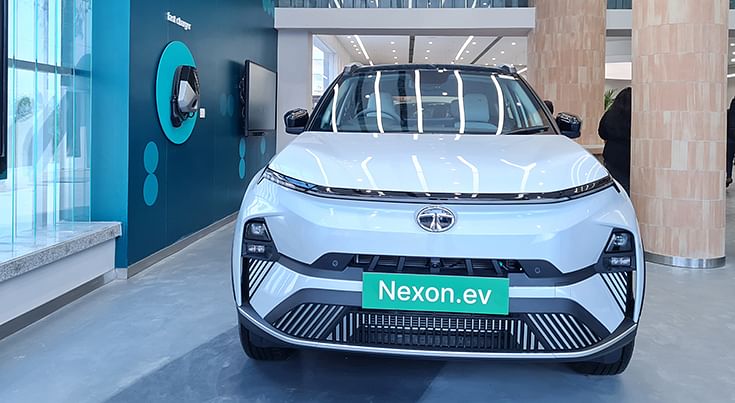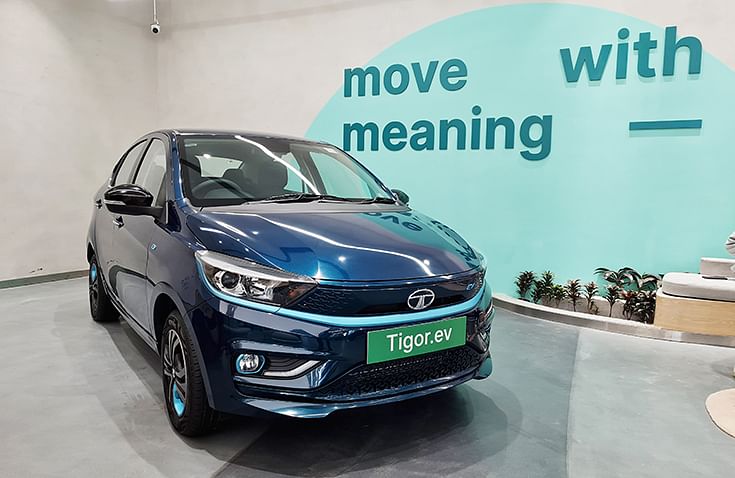Tata Motors' electric car and SUV sales to surpass 75,000 units in FY2024
While this will be 25,000 units less than the EV market leader had targeted, as a result of inadequate charging infrastructure across India, Tata Motors is currently averaging monthly sales of over 6,000 units and should clock 75,000 units in FY2024.
Tata Motors, which is the market leader in India’s passenger vehicle segment, with a 71% market share between April and November 2023, had earlier this year aimed to double its EV sales to 100,000 units in FY2024. However, this big number may not be achievable albeit it is well set to clock total EV sales of around 75,000 units this fiscal, making for 56% year-on-year growth.
With total EV sales of 48,187 units in the first eight months of FY2024 (April-November 2023), the company says it will not be able to achieve its aspired-for target by end-March 2024. “While we had taken an aspiration to sell 100,000 cars, we will not be there . . . but we will try to be as close as possible,” said Shailesh Chandra, Managing Director, Tata Passenger Electric Mobility (TPEM), at a media roundtable on the sidelines of the Tata.ev exclusive-EV showrooms’ inauguration in Gurugram on December 21.
“Since there is no way of predicting EV sales in the present scenario, it was important to set a high aspiration, peg a number and work backwards to make it happen, for which the planning and execution involves identifying the products that would be required, growth in charging infrastructure, and the number of cities, as well as convincing corporate and fleet buyers,” he explained.
Aiming for 30% EV penetration of sales by 2025, 50% by 2030
“I think we are good in terms of our actions to deliver such volumes and are, at times, overdoing our actions, but we might not be able to hit that number. We will try to be as close as possible,” Chandra added. The company projects EVs to contribute 30 percent of its total volumes by 2025, and 50 percent by 2030.
While Tata Motors EV sales jumped by 150% from 19,106 units in FY2022 to 47,792 units in FY2023, the company says the alacrity in the domestic EV market, which was booming with a strong momentum in this period, also enabled this surge. However, going from 50,000 units to the 100,000 mark is supposed to be difficult as it would require moving from early-majority to the late-majority EV owners, Chandra explained, and certain bottlenecks, particularly on the charging infrastructure front, are the key inhibitors to this goal. “Once we overcome them, we should be there,” he pointed out.

Chandra is of the opinion that the foray of higher-range EVs in 2024, as well as the further strengthening of charging infrastructure by efforts of several charge-point operators, as well as oil-marketing companies, is set to alleviate range anxiety, and give a fillip to EV adoption in the countr.”
He, however, expressed his optimism in the growth of the EV sector and estimated the industry’s year-on-year growth in CY2023 to be pegged in the range of 90-100% with overall passenger EV sales closing in at around 90,000-95,000 units by the end of the calendar year.
Chandra estimated that the Indian electric passenger vehicle market would register YoY growth of 40% in CY2024.
He said that while electric passenger vehicles do not get incentivised under the FAME scheme, the prevailing benefits of a low 5% GST rate, as well as waiver of road tax in several states, is aiding EV penetration in the country, and the government must continue to support the sector until a 20 percent penetration is achieved.
“Various governments globally have supported EV adoption until the penetration has touched 18-20%, and therefore the government (in India) must support EVs until a similar penetration is reached. If EVs are not supported by the government, of course, EV sales will get impacted,” he cautioned.

Tata’s fast-increasing EV retail footprint
Since the introduction of the Tiago EV earlier this year in January, Tata Motors says it has unlocked a huge potential to grow its EV sales by adding 160 more cities in the last 12 months that it currently serves with its all-electric offerings – Tata Tiago EV, Tigor EV, and Nexon EV. According to Chandra, “While we were earlier focusing more on opening stores in cities that we thought were the right locations, however, there were a lot of surprises.”
He cited the example of Bhilai in Chattisgarh, which surpassed the company's expectations, and has been registering a strong level of EV adoption. “There are large markets showing less penetration, and smaller markets with higher penetration. As we have a huge amount of data from our 170 cities to ascertain where we need to increase our penetration, therefore, we will segment the micro markets into three categories to grow the EV penetration further.
“These categories would be markets with an existing high market penetration and visibility of EVs; markets with emerging EV traction but missing enablements, and lastly, a market like Chandigarh, where we need to start all over again by spreading awareness and myth busting. We will segment these markets, and approach them differently,” explained Chandra.
Tata Motors, which inaugurated its two flagship EV-exclusive showrooms in Gurugram on December 21, plans to open 50-100 more such stores across the country in the next 12-18 months. With a battery of 10 new all-electric product launches lined up until 2025, the company says it will be a diversified player in the passenger EV segment.
“Unlike many OEMs which are rather concentrated, our strength would be a spectrum of EV models across price points with very different battery ranges to allow customers to choose as per their use case. We would offer EVs in the Rs 800,000 to over Rs 30-lakh price segments,” Chandra signed off.
ALSO READ:
Tata Motors sells 46,143 cars and SUVs in November, EV share at 13% in FY24’s first 8 months
Over 50,000 Tata Motors EVs sold in small-town India
Sourcing Specialist Sudhir Chikhle joins Tata Motors' EV business as Chief Purchase Officer
RELATED ARTICLES
Cosmo First diversifies into paint protection film and ceramic coatings
The Aurangabad, Maharashtra-based packaging materials supplier is leveraging its competencies in plastic films and speci...
JSW MG Motor India confident of selling 1,000 M9 electric MPVs in first year
The 5.2-metre-long, seven-seater luxury electric MPV, which will be locally assembled at the Halol plant in Gujarat, wil...
Modern Automotives targets 25% CAGR in forged components by FY2031, diversifies into e-3Ws
The Tier-1 component supplier of forged components such as connecting rods, crankshafts, tie-rods, and fork bridges to l...






 22 Dec 2023
22 Dec 2023
 6783 Views
6783 Views








 Autocar Professional Bureau
Autocar Professional Bureau




